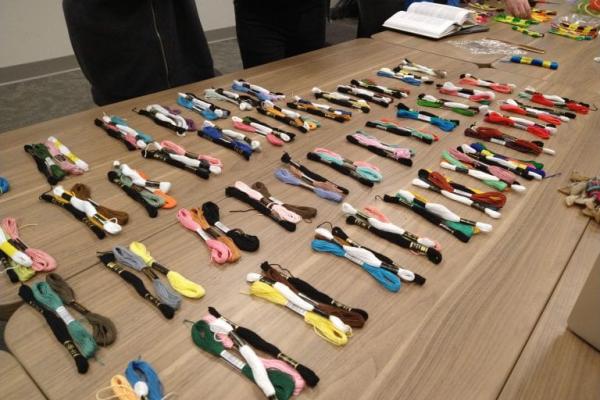Kawsay Ukhunchay Collaborates with S.T.E.A.M. Factory for “Stitching our Community Back Together” and “Doodles” Member Engagement Projects

This month the Kawsay Ukhunchay Andean and Amazonian Indigenous Art and Cultural Artifacts Research Collection partnered with STEAM Factory to bring two creative member engagement activities to STEAM members. Kawsay waqaychaqkuna (those who safeguard, keep and preserve with cariño and care) worked together to prepare 50 embroidery and doodle kits for engaging in Andean-inspired practices of making/doing while thinking/talking to shake up interactions during Zoom meetings.
Embroidery in the Andes dates back almost 10,000 years with some of the most elaborate examples of embroidery and textile techniques emerging from Paracas and Nasca cultures. Embroidery captures the notion of embodied experiences of learning by doing. Moreover, kawsay waqaychaqkuna observed that in the Andes, folks typically accompany any type of conversation, reflection or personal interaction with making or doing something with their hands, whether it be weaving, embroidering, shucking corn or sorting grains.
Claire McLean, graduating senior majoring in Spanish, spearheaded the project initiative drawing on this inspiration from Andean cultures which presents a way of mediating dialogue. Cameron Logar, undergraduate major in Biochemistry with minors in Spanish and Andean and Amazonian Studies, supported the project with in-depth research on embroidering traditions in the Andes, dying techniques, and color symbolism.
The Stitching Our Community Back Together project invites STEAM Factory members to engage in this making/doing while thinking/talking activity using a patch of cloth from something meaningful to them during the pandemic shutdown (a pair of jeans or sweatpants worn during COVID isolation, a special blanket, a favorite t-shirt) for the backdrop. In autumn 2022 we will gather everyone’s embroidery pieces and patch them together in a collective quilt as a celebration of our togetherness during our time apart!
For those looking for a slightly more accessible engagement opportunity, we proposed our Doodles project. Alice Cheng, doctoral student in Arts Administration, Education and Policy, conceived of the activity as a series of doodle prompts that folks could continue working off of to keep the body active and the mind creatively engaged while we dialogue on Zoom meetings.
As we contend with disembodied talking heads in Zoom squares, this low stakes and easy access doodling activity emphasizes movement as embodied knowledge and connects to Andean practices of doing/making while thinking/talking. Most importantly, doodling expresses joy, imagination, play, fun! It potentially helps us focus on conversations, keeps us from checking our email! and provides conversations starters as we bridge the online distance until we meet together in person again.
As we collaborated on this activity, kawsay waqaychaqkuna reflected on the significance of lines and patterns as “pathways of knowledge” among Indigenous communities in the Andes and Amazonia. (It is the mythic rainbow-colored anaconda, an embodiment of Sungui the first shaman, that passes to humans their ability to make designs. All possible designs exist virtually in the skin of the anaconda. These designs in turn provide the structure and conditions for generating all conceivable forms). As with the embroidery project, we plan to collect doodles and stitch them together in the form of a collective piece for display at the STEAM Factory.
Our interdisciplinary team of researchers worked together to present these kits at the March STEAM Exchange. Kawsay waqaychaqkuna will follow up with a tutorial on embroidering, concepts of preciousness in the Andes, and making/thinking models for STEAM Factory members in April!






